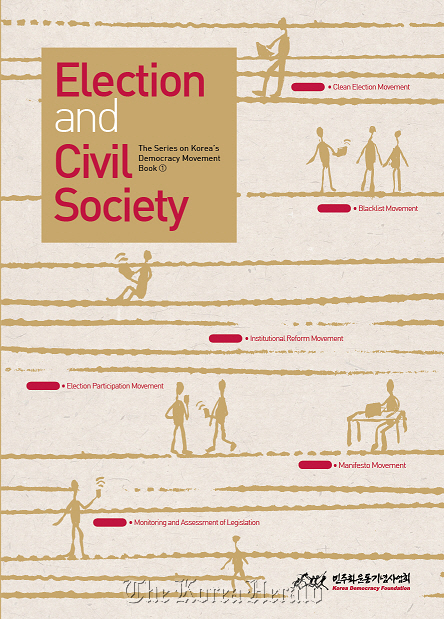Book explores civil society’s role in Korean electoral reforms
By Korea HeraldPublished : July 6, 2012 - 19:43

Jung Young-tae et al.
(Korea Democracy Foundation)
Civil society has played a pivotal role in achieving political freedom and a fairer election culture in Korea.
“Election and Civil Society” describes in chronological order the major election movements initiated by civic groups in the context of Korea’s modern political history.
It is the first of a series of books on Korea’s democratization movement published by the Korea Democracy Foundation.
The book offers valuable insight into Korea’s election movements and the development of Korea’s electoral system in the first two decades after democratization in 1987. It also probes the potential role of civil society in the future of Korean politics.
The book is written by a team of writers including professors from major Korean universities, experts on civil society and government officials. It was edited by Jung Young-tae, Inha University professor of political science and diplomacy.
“Major parties, the media and the National Election Commission had clear limitations in reforming undemocratic and irrational systems,” Jung writes in the introduction.
“It was against this backdrop that further democratic progress required civic organizations’ engagement in politics.”
The book begins by describing the clean election movement started in 1987. It strove to encourage young voters to take part in elections, monitor lawmakers and provide key information to voters. It was the first effort toward an election culture that was not corrupted by money.
The second chapter looks at the blacklist movement, in which civic groups drew up a blacklist to prevent corrupt lawmakers from being nominated and elected. The movement was initiated in 2000 by progressive civic groups.
The following chapters deal with civil society’s effort to change undemocratic systems, and the increasing involvement of women, environmentalists and netizens in the policy making processes.
The book also describes the change in the election system brought by the Manifesto Movement in 2004. The movement encourages the election of candidates based on the verifiability and feasibility of their policies.
Jung ends the book with a brief summation of the changes since 2007, when the book was first published in Korean.
“The people’s distrust and dissatisfaction with the political establishment have grown. Their confidence in civic groups has also weakened,” he writes,
“Ideological confrontation within civil society intensified as conservative groups jumped into the sphere of public debate, which had previously been dominated by their progressive rivals.
“On the other hand, the development of information technology allowed ordinary citizens to participate more easily in public debate.”
The book is not for sale and will be distributed free of charge to interested people and NGOs.
(Jungho1991@gmail.com)
-
Articles by Korea Herald








![[Weekender] Pet food makers bet big on ‘recession-free’ pet food market](http://res.heraldm.com/phpwas/restmb_idxmake.php?idx=644&simg=/content/image/2024/05/10/20240510050754_0.jpg&u=20240511163252)










![[What to play] Musical tributes to family in the month of family](http://res.heraldm.com/phpwas/restmb_idxmake.php?idx=642&simg=/content/image/2024/05/09/20240509050795_0.jpg&u=)